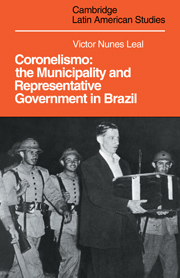Book contents
- Frontmatter
- Contents
- Editor's note
- Introduction by Alberto Venancio Filho
- A note on the term coronelismo
- 1 Notes on the structure and functioning of coronelismo
- 2 Powers of the municipalities
- 3 The elective principle in municipal administration
- 4 Municipal revenue
- 5 Organisation of the police and the judiciary
- 6 Electoral legislation
- 7 Conclusion
- Notes
- Bibliography
1 - Notes on the structure and functioning of coronelismo
Published online by Cambridge University Press: 05 October 2010
- Frontmatter
- Contents
- Editor's note
- Introduction by Alberto Venancio Filho
- A note on the term coronelismo
- 1 Notes on the structure and functioning of coronelismo
- 2 Powers of the municipalities
- 3 The elective principle in municipal administration
- 4 Municipal revenue
- 5 Organisation of the police and the judiciary
- 6 Electoral legislation
- 7 Conclusion
- Notes
- Bibliography
Summary
Introductory remarks
Anyone who wishes to understand the nature of political life in rural Brazil must, first of all, take into account the notorious phenomenon of coronelismo. It is not a simple phenomenon, involving, as it does, a number of complicated factors relating to politics at the local government level. It will be the object of this work to examine these characteristics. Given the regional peculiarities of coronelismo and its variations over periods of time, the present study could only have been totally satisfactory if it had been based on detailed regional analyses of a kind which we were unable to undertake. Nevertheless, the most accessible documentation, and that relating to different regions, revealed such similarities in essential aspects, that we can undertake an over-all examination with the available material.
As a preliminary observation, we must stress that we conceive of coronelismo as the result of the superimposition of structural forms, evolved through the representative process, on an inadequate social and economic structure. It is not, therefore, a mere survival of private power whose hypertrophy constituted the typical phenomenon of our colonial history. It is, rather, a specific manifestation of private power or, to put it another way, an adaptation whereby the residual elements of a previously extravagant private power have been able to coexist with a political regime which accepts the principle of broadly based representative government.
- Type
- Chapter
- Information
- CoronelismoThe Municipality and Representative Government in Brazil, pp. 1 - 25Publisher: Cambridge University PressPrint publication year: 1977



